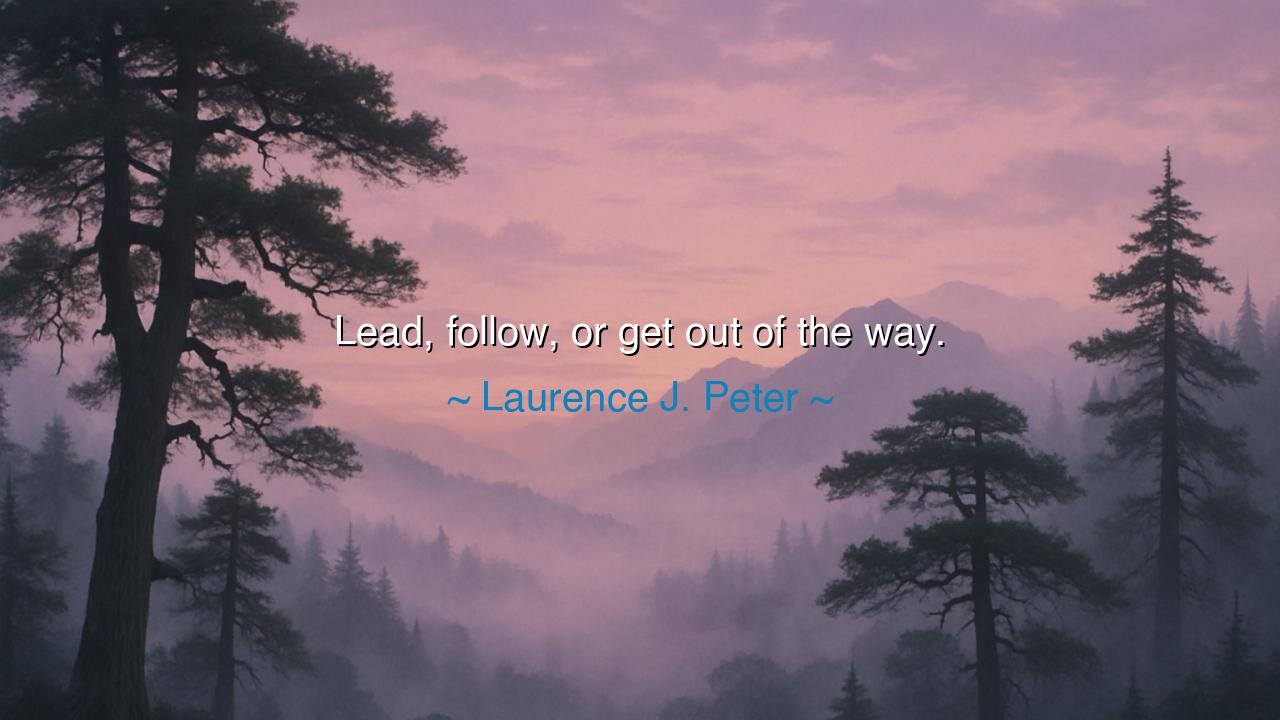
Lead, follow, or get out of the way.






The words of Laurence J. Peter, “Lead, follow, or get out of the way,” sound like the command of a trumpet before battle. They are short, sharp, and uncompromising, reminding us that in times of action there is no room for hesitation, no space for half-measures. To lead is to take responsibility, to chart a course, and to summon others to follow. To follow is to commit to the vision of another, to give one’s strength in unity and discipline. But to stand idle, to block the path with indecision, pride, or fear—this is to hinder not only oneself but all who strive toward the goal.
The ancients themselves understood this law. In the phalanxes of Greece, each warrior had only three choices: to lead at the front, to follow by holding the line, or to step aside for one more willing. Hesitation or disunity meant collapse. The Romans, too, believed in the stern discipline of decision, for in war and in life, delay is often more dangerous than defeat. Peter’s words are the modern echo of this ancient truth: progress demands clarity of role, and those who cannot lead or follow must not obstruct those who can.
Consider George Washington at the crossing of the Delaware. He stood as the leader, guiding his weary men across icy waters. His soldiers, battered and cold, did not argue or hesitate—they followed. And because the leader led and the followers followed, they struck a decisive blow at Trenton. Had there been hesitation, excuses, or those who stood in the way, the daring venture would have failed. Victory was born from this union of leadership, followership, and the absence of obstruction.
But history also warns us of the cost of those who refused Peter’s wisdom. In times of great reform, many cling to the old ways—not by leading with new vision, nor following with open hearts, but by standing in the way. They do not move forward themselves, and they block the path of others. Such was the fate of many rulers in ages of revolution, who neither led their people into justice nor stepped aside for new leaders. They were swept away in the tide of history, remembered not for greatness, but for stubborn delay.
The meaning of the quote is therefore both stern and liberating. Stern, because it demands that each of us decide: What role will I play? Will I lead with courage? Will I follow with loyalty? Or will I admit that I cannot contribute and step aside with humility? To linger in indecision, to obstruct through pride, is to weaken the whole. Yet the words are also liberating, for they remind us that both leading and following are honorable paths. One need not always command; to follow with strength is to honor the leader and strengthen the cause.
The lesson for us is clear: in moments of purpose—whether in family, work, or community—we must not be the stumbling block. If we have vision and courage, we must lead. If we see another’s vision worth following, we must give our support. And if we can do neither, then the noble act is to step aside and allow the path to remain clear. This is not weakness, but wisdom, for progress is made only when each person knows their place in the great endeavor.
The practical action is this: reflect on your role in the tasks before you. If you sense the fire of leadership, rise and guide with humility and strength. If not, then follow with discipline, giving loyalty and unity to the one who leads. And if you cannot bring yourself to do either, then at least have the honor to remove yourself from the path, that others may continue unhindered. In this way, progress is made, battles are won, and goals are achieved.
Therefore, O listener, engrave upon your soul the timeless command: “Lead, follow, or get out of the way.” For life does not wait for hesitation. Destiny favors the decisive, the committed, and the humble. Choose your role with courage, and you will never be remembered as one who stood in the way of greatness.






AAdministratorAdministrator
Welcome, honored guests. Please leave a comment, we will respond soon